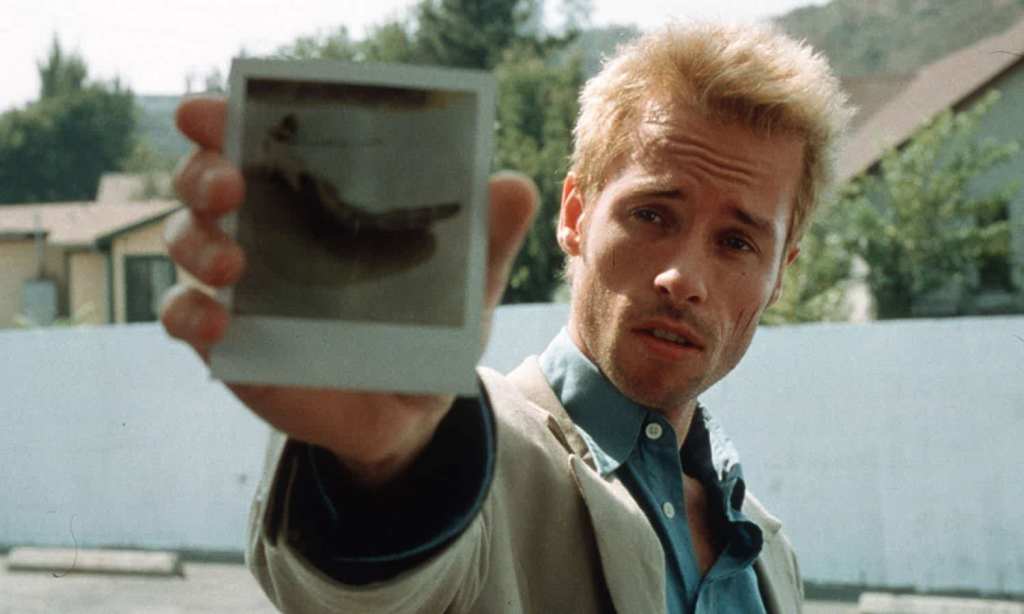After heading out to cinemas to see Tenet without knowing a damn thing about it other than it being ‘a Nolan film’, I realised something: somewhere along the line, Christopher Nolan went from directing franchise films like the Dark Knight trilogy, to becoming a franchise in and of himself. In fact, the only name that can draw a crowd bigger than Nolan is Marvel, and even that is probably debatable.
So, what compels us to go see a Nolan film on name alone? While not technically a connected universe, like all franchises, there is certainly some connective tissue between all of his films.
This DNA chain that links the spiritual Nolan-verse together all starts with his 2000 break-out indie darling (and lord of uni-student DVD shelves), Memento.
If it’s been awhile, here’s the original trailer as a refresher:
This back-to-front story of a man named Leonard who can’t create short term memories was filmed 20-years-ago with a budget of $200million less than Tenet.
Shot in 4 weeks, it’s only special effect was some strategic use of black and white, yet somehow, these two films have more in common than you would think — as does every film in between.
From tropes to themes to structure – each movie is like a deeper exploration of a seed already planted two decades ago.
In re-watching Memento, these are the big three that stand out most — and to avoid spoilers, I’ll focus primarily on his pre-Tenet resumé.
The manipulation of time as the ultimate antagonist
Leonard’s inability to create short-term memories sees him trapped in a looping 10-minute race against time to track down his wife’s murderer before his brain hits the reset button. This isn’t worlds apart from Interstellar, only it’s external forces like black holes that turns time against our corn-farming heroes. This comes to a head on the Miller water planet (aka the Matt Damon planet), where every 10 minutes wasted, means over a year lost elsewhere.
See also: Inception, Tenet and Dunkirk.
The perception of self and illusion of reality
Even as we see the world from his POV, we eventually learn that Leonard is not just an unreliable narrator for the film, but also for himself, having no idea of the self-sabotage he has put in place to keep him on the hamster wheel of ‘a puzzle he could never solve’. This idea of whether one can truly trust one’s own thoughts is the central premise of the mind-heist-athon that is Inception. Leonard tells himself lies in Memento, in the same way, Cobb and his gang of brain-busters plant lie in the minds of others. Leonard effectively ‘incepted’ himself.
See also: The Dark Knight trilogy, Insomnia, The Prestige, Following
Dead Wives (and sometimes girlfriends)
The whole premise of Memento centres around a dead wife. It not only drives the plot, but it’s also the only real character trait of Leonard. This one is present in a few too many Nolan films and… it’s not great.
All too often, wives (and sometimes girlfriends) die, just so our protagonist can be more interesting. It’s more broadly known as ‘Fridging’, (in reference to a Green Lantern comic where the hero’s girlfriend is killed and stuffed into a fridge to motivate another cosmic adventure), and it lives well beyond Nolan (Deadpool 2, Avengers: Infinity War), but having been a character motivator in nearly half of his movies, he has certainly gone to that well a few too many times. There is, however, some good news: Tenet might just signify his departure from this character crutch (if that’s a spoiler, this is might be a bigger problem than I first thought!).
See also: Inception, The Dark Knight, The Prestige, Interstellar
They aren’t all winners (take it easy on the wives, Nolan!), but the linkage is there and it’s pretty amazing.
In what was essentially his first real film (technically his second), Nolan incepted us all with the seeds of ideas he would build on in the decades that followed, little mementos for us to remember him by. How very Christopher Nolan of him.
Tristan is one half of the Double Impact podcast, where, along with his mate Greg, are on a mission to re-watch every movie that meant something from their childhood. Each episode they review a ‘classic’ film from the 80s or 90s and determine how it stacks up in the modern era. (They use the term classic very loosely.)
You can listen to Double Impact with Tristan and Greg below.







